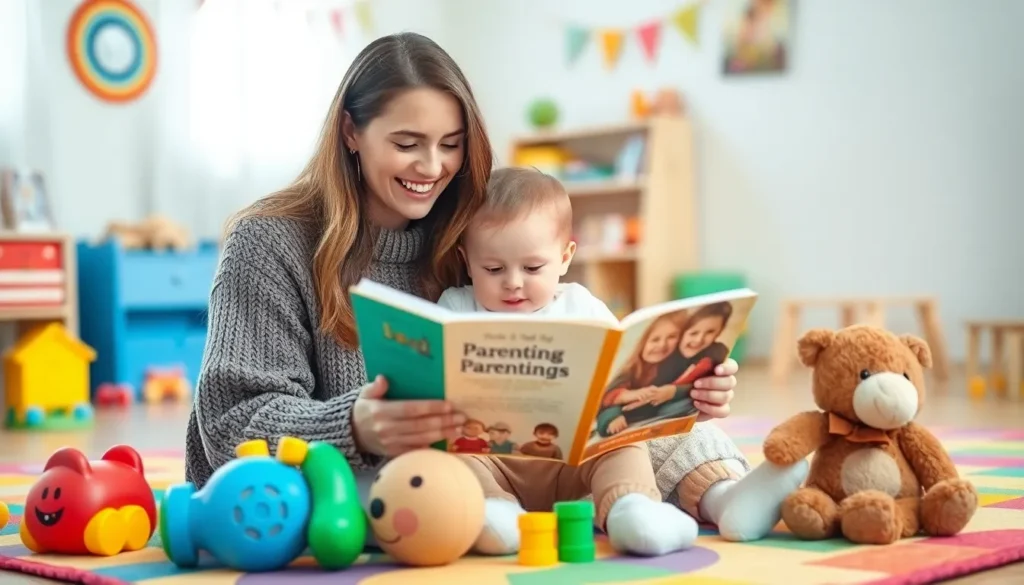Parenting can feel like navigating a maze blindfolded, with toddlers throwing tantrums like confetti. In this chaotic journey, parenting books can be a lifeline, offering wisdom from seasoned pros who’ve survived the wild ride. Whether you’re looking to decode the mysteries of toddler behavior or seeking strategies to foster independence, there’s a book out there just waiting to be your trusty sidekick.
Table of Contents
ToggleOverview of Parenting Books
Parenting books offer valuable insights for caregivers seeking effective strategies. They provide essential knowledge to tackle challenges, such as managing toddler tantrums.
Importance of Parenting Books
Parenting books serve multiple purposes in a caregiver’s journey. They provide evidence-based guidance from experts, enhancing understanding of child development. These resources help decode complicated behaviors, offering tactics for effective communication. Enhanced confidence in decision-making becomes possible with well-researched information. Parenting books also foster connections with other parents, creating a supportive community. This shared knowledge strengthens overall parenting skills, leading to positive outcomes for both children and caregivers.
Types of Parenting Books
Various types of parenting books cater to different needs and preferences. Guides on child development focus on age-specific milestones and growth patterns. Books addressing behavior management provide techniques for discipline and conflict resolution. Health-oriented parenting books cover nutrition, sleep strategies, and overall wellness. Books on parenting philosophies, such as attachment or positive parenting, offer distinct approaches to relationships with children. Each category enhances understanding and equips caregivers with tools to navigate parenting challenges effectively.
Popular Parenting Books

Parenting books serve as vital resources for caregivers seeking effective strategies and insights. Numerous titles in the market resonate with diverse parenting styles, making it easier to find guidance tailored to specific needs.
Classic Titles
Classic parenting books have stood the test of time, offering foundational knowledge that resonates across generations. Titles like “The Whole-Brain Child” by Daniel J. Siegel and Tina Payne Bryson provide insights into brain development, fostering emotional intelligence in children. Another beloved classic, “How to Talk So Kids Will Listen & Listen So Kids Will Talk” by Adele Faber and Elaine Mazlish emphasizes communication strategies that enhance parent-child relationships. These books remain relevant as caregivers seek tried-and-true methods for nurturing their children.
Contemporary Favorites
Contemporary favorites capture current parenting trends and challenges, reflecting modern family dynamics. “The Happiest Baby on the Block” by Harvey Karp details techniques for soothing infants and promoting better sleep. “Simplicity Parenting” by Kim John Payne focuses on reducing clutter and stress to foster a healthier family environment. These popular recent publications cater to today’s parents, addressing pressing issues such as work-life balance and technology’s impact on child development. Each book offers practical advice for navigating the complexities of contemporary parenting.
Criteria for Evaluating Parenting Books
Evaluating parenting books requires specific criteria to ensure they meet the needs of caregivers effectively. Two essential factors in this evaluation include author credentials and the reliance on evidence-based practices.
Author Credentials
Assessing author credentials is crucial when selecting parenting books. Authors with backgrounds in child psychology, education, or social work offer invaluable insights based on research and experience. Look for credentials such as advanced degrees, professional titles, and published works in reputable journals. Authors who have practical experience in parenting or have worked directly with families often provide relatable advice. Their understanding of real-life challenges enhances the credibility of their guidance. Qualifications can signal whether the strategies presented are grounded in solid expertise.
Evidence-Based Practices
Focus on evidence-based practices when evaluating parenting literature. Books that reference substantial research studies or provide data supporting their claims can significantly enhance a caregiver’s understanding. Strategies grounded in existing psychological or developmental science tend to be more effective in addressing specific parenting challenges. Evidence-based methods promote sustainable, long-term benefits for children and parents alike. Look for citations from peer-reviewed journals and trusted institutions as indicators of rigor. Resources emphasizing these practices serve as reliable tools for caregivers looking to implement effective techniques in their parenting approach.
Benefits of Reading Parenting Books
Parenting books offer diverse advantages for caregivers. They provide essential knowledge and insights that enhance understanding of child development and behavior.
Gaining Knowledge and Insights
Books serve as valuable resources for acquiring knowledge about children’s growth stages. Information on topics like toddler tantrums and effective communication helps clarify complex situations. Expert-authored books present research-backed strategies for managing challenging behaviors, enabling caregivers to apply evidence-based practices. Different parenting philosophies explored in these texts allow readers to find approaches that resonate with their own values. Consequently, access to various viewpoints aids in better decision-making in parenting.
Building Confidence in Parenting
Reading parenting books fosters confidence in caregivers. Implementing effective strategies from experts enhances parents’ belief in their abilities. Gaining insights into common challenges reassures them that they are not alone. These resources often include relatable anecdotes and advice from experienced parents, creating a sense of community. Knowing there are proven methods for addressing issues provides reassurance, helping caregivers navigate their parenting journey with more assurance.
Parenting books are more than just pages filled with advice; they’re essential companions in the journey of raising children. By offering insights from experts and relatable experiences from fellow parents, these resources empower caregivers to tackle challenges with confidence.
Whether it’s understanding toddler tantrums or navigating modern parenting dilemmas, the right book can provide invaluable strategies and support. Embracing the wisdom found in these pages fosters a deeper connection to child development and enhances the overall parenting experience.
As caregivers explore the diverse array of titles available, they’ll find that each book can serve as a stepping stone toward more effective and fulfilling parenting.

